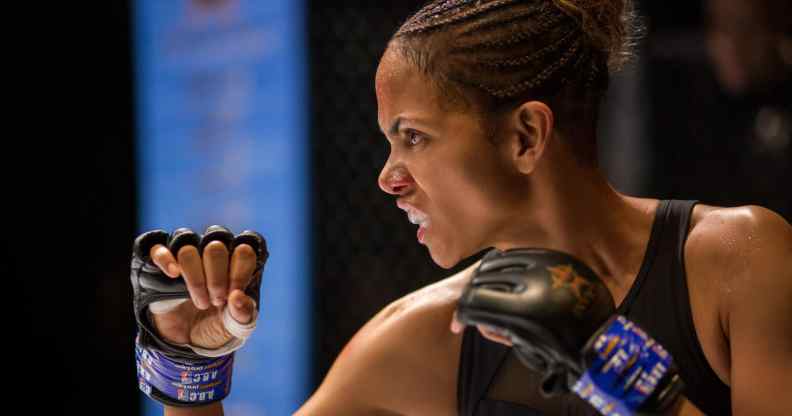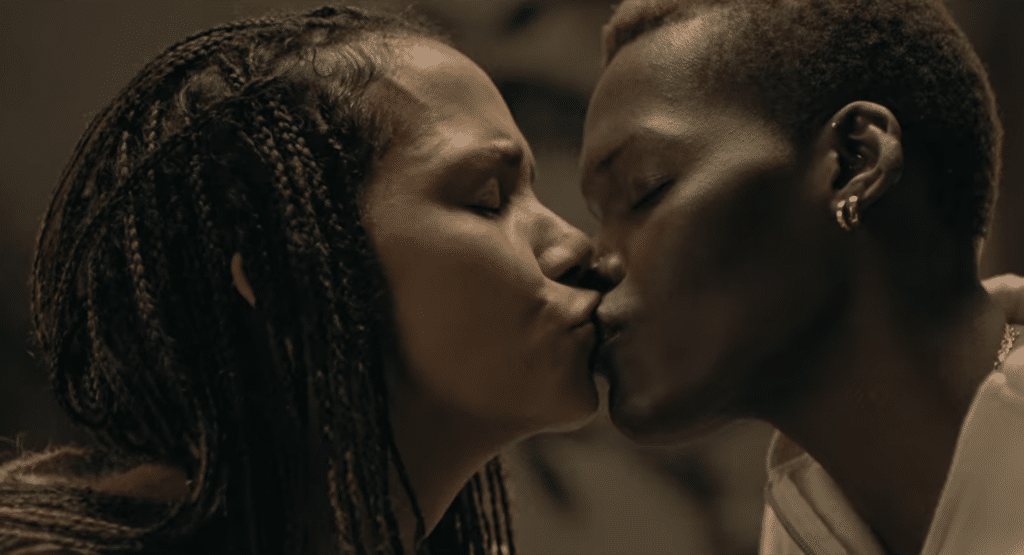Halle Berry’s queer Black love story in new Netflix drama Bruised is a frustrating anti-climax

Halle Berry in Bruised. (Netflix)
Halle Berry’s directorial debut Bruised falls flat when it comes to its queer, Black romance.
Currently trending in Netflix’s top 10, Bruised is the highly-anticipated female-led movie fronted and directed by Hollywood legend Halle Berry. It reimagines the archetypal Rocky Balboa story for the UFC generation, with MMA – not boxing – as the combat sport of choice.
Jackie Justice, played by Berry, is a troubled ex-UFC champion, haunted by her failure in a career-ending fight which led to her fleeing the ring – both literally and metaphorically.
Despite Justice wanting to leave her fighting days behind and bury the shame of her humbling defeat, she finds herself drawn to the battle arena once more when life throws an unexpected curveball her way: the arrival of her estranged young son following his father’s death.
While Netflix believed in the film enough to spend an estimated $20 million on acquiring the distribution rights, the critics are less convinced. Bruised has been slammed for rehashing overtired boxing movie tropes and taking on too many heavy themes (leading to accusations of trauma porn).
Bruised is indeed a film with more grit than an Icelandic motorway. From substance abuse to child sexual abuse, domestic violence to murder, there are few emotionally hard-hitting stones left unturned. In fairness to Berry and screenwriter Michelle Rosenfarb, it might be argued that the film simply doesn’t shy away from the life of tough knocks some suffer as a result of poverty and socioeconomic neglect.
Whether you think Bruised commits the cardinal sin of overkill or simply offers an unflinching stare into the abyss of the human condition, there’s one thing the critics do seem to agree on: Sheila Atim’s winning performance as Buddhakhan, Jackie’s trainer and queer love interest. The Guardian called the Ugandan-born British actress the “saving grace” of the film, while NME hailed the queer frisson as “the one fight-movie cliché that hasn’t been milked to death”.

Halle Berry in Bruised. (Netflix)
It’s a shame then that the emotional and sexual intimacy between the two women doesn’t take up more of the movie’s bandwidth. There’s the occasional teaser leading up to the moment the women finally give into their passions: in one scene the two straddle each other while practicing MMA groundwork, in another scene the two share a dinner laden with will-they-won’t-they tension as Jackie confesses that Buddhakhan seems to “do everything right”.
These appetizers would be deliciously satisfying if the love affair itself wasn’t so short-lived. It’s not until 80 minutes into the movie that we finally get the queer Black intrigue we’ve been waiting for. Although it doesn’t disappoint – it’s a beautifully tender moment of Black sapphic sexuality – the fling is over before it’s even truly begun. One montage and a few minutes later, the couple are back in bed. Despite their sizzling chemistry, Jackie ends things with Buddhakhan because she’s “not ready for a new relationship”. The amour, and the film’s queer Black content, end there.
It’s a frustrating anti-climax. For the queer Black viewer there’s a sense of having been tormented with a laborious build up, only for all to end in a cursory and unsatisfying nod in our direction. Ostensibly, the breakup exists to underline the wider narrative that Jackie is able to face her demons and quell her fears by herself, for once. But the queer Black relationship could’ve been so much more than a fleeting plot device.
It had the potential to bring fresher, more nuanced layers of character and storytelling in a film laden with heavy-handed tropes. We’ve all seen Rocky, but we’ve never seen Rocky meets Rafiki. Had the love affair been allowed to mature, the reviews and critical reception to Bruised might’ve looked very different.

